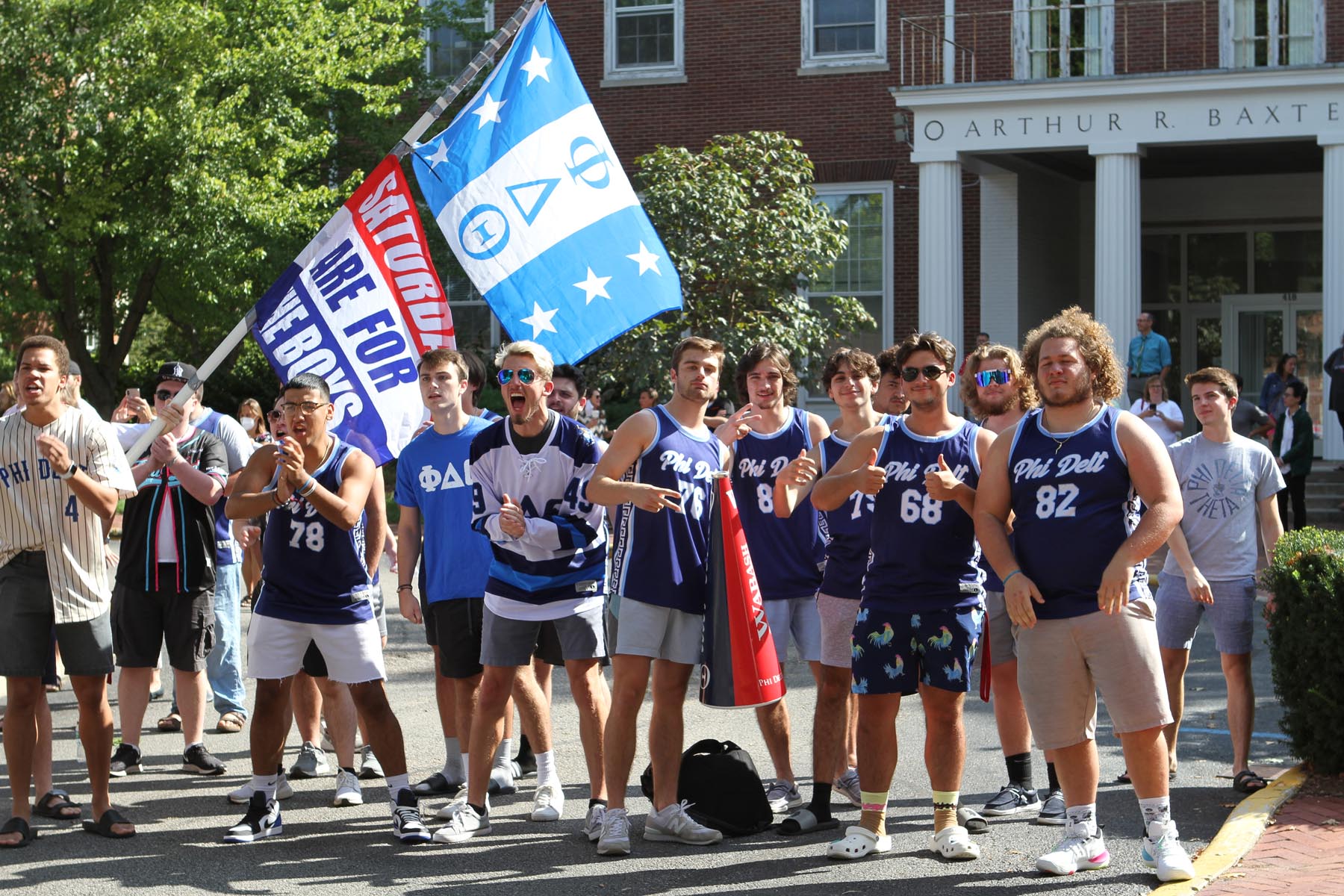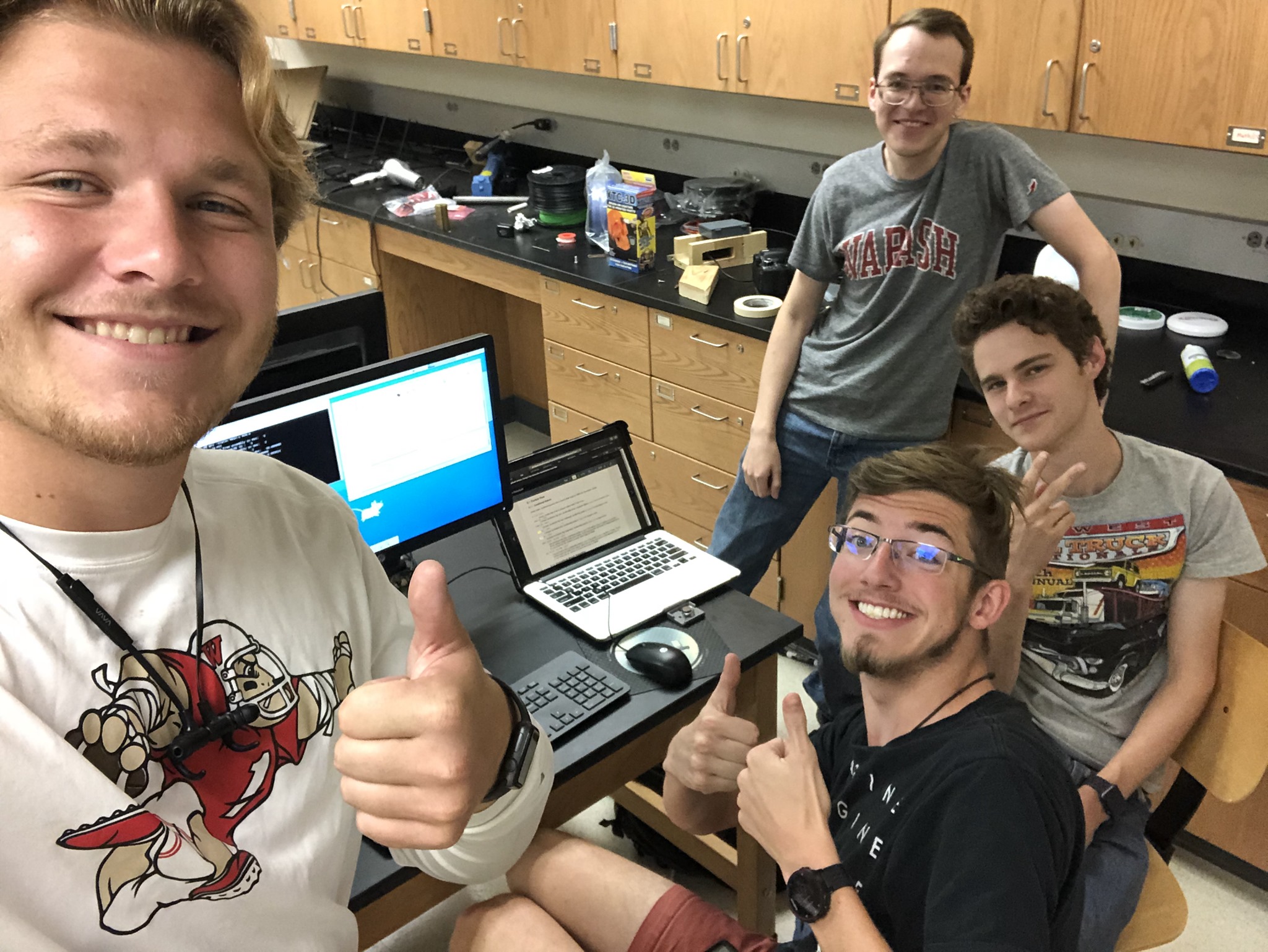It would be a challenge for anyone to find another student on campus quite as animated about learning as Andrew Rippy ’22.
Just ask one of his instructors, like Department Chair and Professor of Physics James Brown, what it’s like having the computer science, mathematics, and physics triple major in class.
“He’s a pile of energy,” said Brown, who’s taught Rippy in a handful of courses since his freshman year.
“There’s a cohort of students, four tight-knit physics majors. All have different personalities, and Rippy is the most outgoing and excitable in the group. One of the students often acts as the moderator, and pulls Rippy down to earth when he gets a little too excited and carried away,” Brown said with a chuckle.
“In all seriousness, Rippy has been a great joy to work with,” he said. “He’s a hard worker, outgoing and his enthusiasm spreads through the class.”
Professor of Computer Science Mark McCartin-Lim said there’s a significant difference between a class that has this senior in it and one that doesn’t. And it’s not just because of the brightly colored clothes one can often find Rippy sporting or the glitter that gets left behind in classrooms when he returns to campus after attending a rave.
“There are a number of academically strong students, but few who have that sort of unique mix of energy, charisma, and both the soft social skills and hard academic skills like Rippy,” McCartin-Lim explained. “It’s 100% authentic. He puts so much of himself out there.
“Sometimes I think his only weakness is that he wants to do everything. When he finds that one thing that he really wants, his real passion,” McCartin-Lim said, “I have no doubt he’s going to be very, very successful.”
Triple major, ‘Why not?’
With a handful of AP college credits under his belt coming in as a freshman from Woodbry, Minnesota, Rippy was determined to take as many classes at Wabash as he could in subjects that he enjoyed studying most: computer science, physics and mathematics.
“I came in really wanting to do computer science, but I also loved physics in high school. I found out that when you do the physics major, you get a mathematics minor along with it,” said Rippy, a Lilly Scholar. “So, I thought, ‘Well, a lot of the same concepts in math pop up in computer science and physics, so why not just add math as another major? It’s just an extra four or five classes. Why not?’”
Chad Westphal, Department Chair and Professor of Mathematics and Computer Science, has advised Rippy since his sophomore year and has been the one to help craft together a class schedule year after year for the triple major.
Logistically, Westphal said, pursuing a triple major is very, very hard to do.

“I knew he was a strong student and capable of the work, but as a matter of squeezing everything in and not having conflicts, it was not easy to pull off,” Westphal said. “We thought of creative ways where we could leverage the really, really strong background that he had to make sure he wasn’t repeating classes that he already had experience in. He was able to test out of some classes and sort of leapfrog his way through.”
Westphal never doubted that Rippy would succeed in his studies. The first time the professor got to witness his student thrive was when he took advanced differential equations.
“This is an upper-level class, and it’s so rare for a sophomore to be in it, but Rippy was very advanced,” Westphal said. “He was a lot of fun to have in class. He was enthusiastic and always seemed to be one step ahead of where I was in the lecture because his brain moves very quickly. I would be on step three and his brain is already on step six.
“And he’s not shy about it. He’d go, ‘Oh, I know where this is going!’ At any point, if I wanted to, I could just toss him the chalk and know he would be able to take over,” Westphal laughed. “He did very well in that course. I think completing an advanced class as a sophomore really set him up and strongly built his confidence.”
Riding the wave
Rippy has distinguished himself at Wabash through a variety of campus leadership roles and academic achievement.
He is a member of Phi Delta Theta fraternity, and is active in a handful of organizations including Spanish Club, Computer Science Club, Math Club, the Society of Physics Students and sh’OUT. He’s been involved in the theatre department, and performed as Estes last year in local playwright Bennett Ayre’s “Sabertooth!”
Rippy was one of five juniors to be inducted into Phi Beta Kappa, the oldest and most prestigious academic honor society in the United States. He also earned distinction (the highest level of passing) in comprehensive exams for physics.
Finding time to balance out his busy schedule was challenging for Rippy, especially his first two years at Wabash when he was a member of the track and field and cross country teams.

“You can almost consider each class to be its own little wave,” Rippy said. “There’s a lot of course work and deadlines, and then there’s a dip, then there’s a lot of stuff again, and then the wave dies off some. When you bunch all of those waves together, sometimes they coincide hard and it can be really overwhelming.”
At one point during the 2020 semester, Rippy remembers taking six classes and a lab in addition to being part of the track team.
“My life my was so regimented that I would wake up at 7 a.m., go to the gym, go to class from 8 a.m. until noon, grab my second backpack for track and field, go to class from 1 to 4 p.m., then run from my class to practice and be there until about 6:30 p.m., run home to eat and shower as fast as I could, then work on homework and studying from 7 p.m. until 2 a.m.,” Rippy said. “I did that every single day, and needless to say I was hitting massive burnout at that point. I kept asking myself, ‘Why am I doing this?’”
Rippy stuck with it right until the COVID-19 pandemic hit and he was preparing to come back to campus for his junior year.
“My classes were getting harder, entering 300-level courses. It was starting to become too much, too stressful,” Rippy said. “It just kept mounting and I hit a breaking point where I knew I had to give something up, and sadly it was track.”
Finding balance
Having been a passion of his growing up, giving up running and choosing to not be a part of the team wasn’t an easy decision for Rippy to make. He turned to his mentors on campus, like Westphal, for guidance through the process.
“We had some serious conversations because he was burning the candle at both ends. It’s easy to see his enthusiasm and match it, wanting to cheer him on in that way. But it’s also our responsibility as faculty and staff to help students pull back when there’s a potential for burnout,” Westphal said.
“It was a hard decision for him to give up his athletics. I think I could see in him that he knew it was the right time, but it was still a hard call to make,” he said. “This is the same story with a lot of Wabash student-athletes. They come here doing this sport since they were five, it’s a huge part of their identity. But the reality is many aren’t going to take that further in life after Wabash.

“I was really proud of him,” Westphal said. “It was gratifying to see Rippy admit he needed to find balance and really put himself first, and then work though that separation in a way that prioritized academics.”
Rippy is proud of himself for getting to the point where he is now — being a student who has high academic expectations, but also isn’t afraid to enjoy a social life.
“I think I have a good gauge on how much I need to put in to get what I want, and then when I know I can push something off to have fun,” Rippy said. “I say yes more now to going on hikes at Shades or EDM concerts in Indianapolis on Tuesday nights, even if I know I’ll be exhausted in those early classes the next day.
“I’ll take almost every opportunity I can to hang out with friends and make those memories because I know if I don’t, I’ll never get those chances back,” he said. “You have to appreciate and live in the moment.”
Rippy is preparing to go to graduate school to study computer science. He hopes to use a master’s degree, or potentially a Ph.D. , to pursue a career in quantum computing, machine learning, and/or scientific computing.